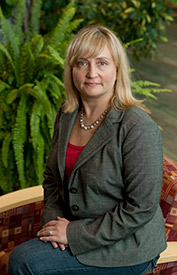Alumni Profile: Sarah Dewane, '98 M.S. Clinical Psychology, '10 Ph.D. Clinical-Community Psychology
by Kathleen McCoy |
"It has been a wonderful journey, but I am glad it is over!" says Sarah Dewane with a big smile after sharing how amazing her doctoral education has been. She is thankful that her dissertation was approved making it official; she graduated in August 2010 from her doctoral program.
 Sarah is the first student to graduate from the Ph.D. program in Clinical-Community
Psychology with a Rural, Indigenous Emphasis - a program jointly delivered and administered
by the Departments of Psychology at the University of Alaska Fairbanks and UAA.
Sarah is the first student to graduate from the Ph.D. program in Clinical-Community
Psychology with a Rural, Indigenous Emphasis - a program jointly delivered and administered
by the Departments of Psychology at the University of Alaska Fairbanks and UAA.
She worked at UAA's Center for Behavioral Health Research and Services (CBHRS) for nine years. CBHRS is a program in the College of Arts and Sciences that houses a workgroup of researchers, providers and educators dedicated to the behavioral and physical health of Alaska's community members. Co-director of CBHRS is UAA psychology professor Dr. Christiane Brems who Sarah also worked with while getting her master's. Dr. Brems was instrumental in getting the Ph.D. program going and served as the chair of Sarah's dissertation committee. Since its inception, Dr. Brems has served as the UAA director of clinical training for the Ph.D. program. Following graduation this summer, Sarah accepted a position at the Alaska Family Medicine Residency as a behavioral scientist.
Sarah's doctoral dissertation was on Fetal Alcohol Spectrum Disorders. She learned a lot about the difficulties doctors have giving treatment across Alaska and will continue to do more work to help prevent and treat FASD. She is thrilled that she can now perform her psychology work collaboratively with behavioral health professionals in a medical setting to provide better care for her patients.
A unique aspect of the joint doctoral program is that it uses a research-practitioner model, meaning it seeks to educate scholars and clinicians who have strong commitments to research, evaluation and clinical practice resulting in community-based action that is solidly grounded in the cultural contexts of the people they are helping. They are actually making a difference while learning.
Sarah says she likes this aspect of the program because it works well with her strengths. "I like having the ability to do both the practice and the research; I like to see that the research I do has impact on people. Due to unique logistics in Alaska, we often have to wear many hats in our profession, functioning as mental health provider and researcher, as well as program developer."
When Sarah was working on her undergraduate degree in communications from Washington State University, she helped with the advertising for the school radio station and newspaper. It was then that she realized she really liked to work with people and started volunteering with crisis centers and hotlines. About this time she visited a friend who had moved to Alaska and fell in love with the Last Frontier.
"I came to visit in January and loved the cold and the snow. I figured if I could love it when most people complain about it, then I would really love it here year-round," she said.
With that in mind she made the effort to go around and visit different agencies and saw even more opportunities to explore a career change. She also visited UAA's campus and really liked the faculty. She moved here and within a couple of years took all of the undergraduate classes in psychology to qualify for the master's program. After receiving her master's from UAA, she began practice as a licensed mental health counselor. One of the projects she worked on involved helping a traumatic stress research group to develop an inventory - a measurement tool to help determine diagnosis and treatment. Again, she greatly enjoyed this because it allowed her to perform both the clinical practice and the research/evaluation.
Sarah's advice to students considering the program is to "pick a dissertation topic you really like because you are going to be spending a lot of time with it and you'll want to be able to still like it after you get your degree."
"I was in cohort number one but every new cohort I've seen amazes me. The students are very accomplished and many are professionals who already serve as leaders in their communities. They are here learning because their community asked them to so they can return with knowledge and experience that will help to improve health and wellness. It shows the strength of the program and where it is going. I am so proud to be associated with it."
For more information about the joint psychology Ph.D. program, visit http://psyphd.alaska.edu.
 "Alumni Profile: Sarah Dewane, '98 M.S. Clinical Psychology, '10 Ph.D. Clinical-Community
Psychology" is licensed under a Creative Commons Attribution-NonCommercial 4.0 International License.
"Alumni Profile: Sarah Dewane, '98 M.S. Clinical Psychology, '10 Ph.D. Clinical-Community
Psychology" is licensed under a Creative Commons Attribution-NonCommercial 4.0 International License.









